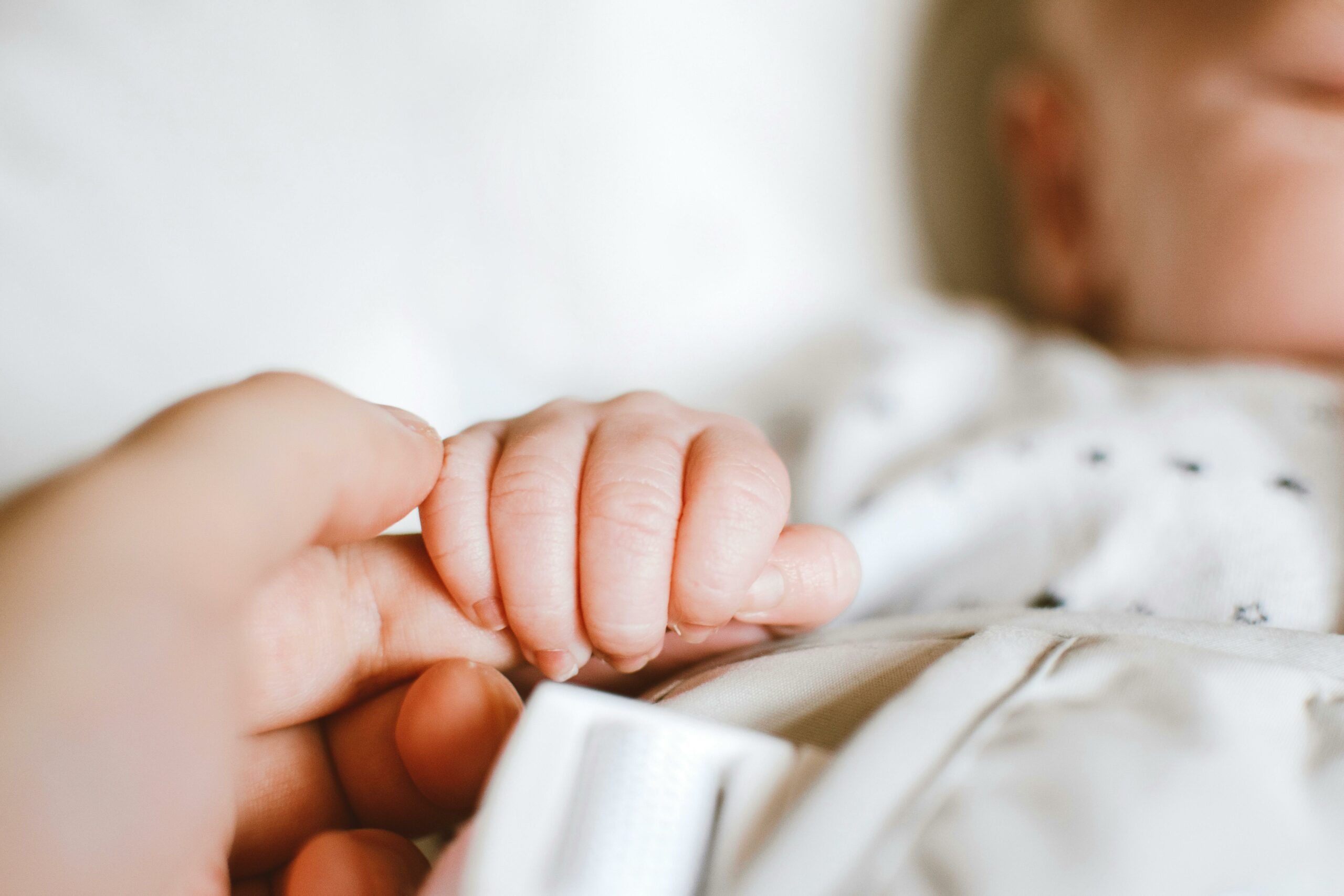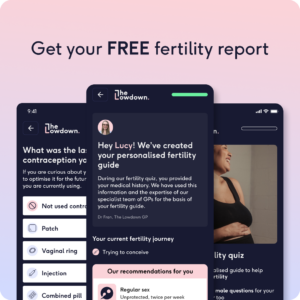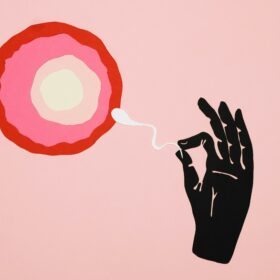
Contraception and the return to fertility

This guide has been peer reviewed by the medical team at The Lowdown and the FSRH and is regularly reviewed as per both clinical content policies
In this article
What's the lowdown?
The combined pill and most other contraceptive methods work to prevent pregnancy in the short term but have no long-term impact on fertility
The majority of women discontinuing hormonal contraception return to their normal menstrual cycles within 3 months
Evidence suggests it can take a while for fertility to return for those who have been using the contraceptive injection
Contraception can mask symptoms of underlying causes of fertility problems
Periods do not equal fertility, but irregular or problematic periods may indicate an underlying medical problem that could affect your ability to conceive
Making the decision to come off contraception is a big one. And if you’re looking to start a family right away, it can bring the topic of fertility to the forefront of your mind. But how exactly does contraception impact a woman’s fertility? Let’s take a look.
Family planning: a phrase that conjures up the image of a 1950s housewife and her desire for 2.4 children with her darling husband living in an idyllic house in the country. Whilst this may inhabit the realms of truth, family planning and access to services supporting this are actually central to gender equality and women’s empowerment. It is defined by the World Health Organization as the process which allows “people to attain their desired number of children, if any, and to determine the spacing of their pregnancies. It is achieved through use of contraceptive methods and the treatment of infertility”¹, or put simply, controlling when pregnancy occurs. The ability to determine whether or not to become pregnant, and how many children to have, has long been recognised as a human right.
For many women not yet ready to start a family – and living in the harsh realities of the present day – this looks more like the active avoidance of pregnancy mixed with the occasional fear of missed pills, incorrect calculations of dates, and other mishaps where we may not have ‘planned’ things quite carefully enough!
But when that 180 flip in thinking hits, and our mindsets switch from ‘I hope I don’t get pregnant’ to ‘I want nothing more than to have a baby’, we might find ourselves questioning whether our thoughts and actions surrounding family planning should have come a little sooner.
So when exactly should you start thinking about your fertility? And should you be concerned about the impact the contraceptive pill may have?
Does being on the pill affect fertility?
Whether you’re taking the combined pill back-to-back or taking a monthly break, there is no evidence to suggest the use of combined hormonal contraceptives has any long-term impact on fertility. Some may be concerned about the length of time they’ve been on the pill, but this, too, has no impact.
It is possible to get pregnant as soon as you stop taking the combined pill and begin to ovulate again (any time from 7 days after your last packet has finished). Studies show the majority of women will ovulate within a month of stopping the pill.² However, it is important to remember when you stop using the pill, your fertility will return to whatever is normal for you, i.e. whether you are able to get pregnant will be the same for you whether or not you have used contraception, bearing in mind any increase in age and the effect this will have.
Here at The Lowdown, we conducted our very own survey to determine what happened to women’s periods after they stopped their method of contraception. We asked women using the combined pill, the progestogen-only pill, the implant, the hormonal coil and the copper coil:
’How long did it take for your period cycle to return to normal after you stopped using this method of contraception?’
Of course, everyone’s ‘normal’ is different, but we asked women to consider their own personal experiences. Of those surveyed, the majority found a return to normal within 6 months, with The Faculty of Sexual & Reproductive Healthcare (FSRH) reporting studies that show 99% of women return to their normal cycle or get pregnant within 3 months.²
A return to normal cycles is always reassuring, but it’s important to remember that periods do not necessarily equal fertility. But, more on that later.
But what about fertility after the contraceptive injection?
We also surveyed women who had previously used the contraceptive injection, asking them the same question about their menstrual cycle. This is where we found things took a little longer. Our results show it took up to 18 months in some cases for women to return to their normal menstrual cycles.
A study carried out looking at the link between the use of contraceptives and a woman’s ability to become pregnant found the contraceptive injection did indeed result in the longest delay to the return of fertility.³ But why should this be the case?
The contraceptive injection works by stopping ovulation and commonly causes changes to bleeding patterns, including stopping periods which many find is a beneficial side-effect. One user of The Lowdown wrote:
“Really recommend the injection. Loved that it stopped my periods completely. No effect on my mood which was great as other contraceptives I’ve used have made my mood really low. Really convenient only having to get it every 12 weeks.”
Due to the link (known as the menstrual cycle!) between periods and ovulation – where the all-important egg is released in preparation for fertilisation – the delay in the return of your periods may be associated with a delay in the return of ovulation, and may result in a knock-on effect on your chances of conception.
This delay, however, is only short-term. And while you may be experiencing irregular cycles after stopping the injection, you may be ovulating. Over 80% of women trying to conceive may expect to become pregnant within 15 months of their last Depo-Provera injection and after 2 years there is no significant difference in pregnancy rates when compared with users of non-hormonal contraception.⁴
Waiting for your fertility to return after stopping the injection can be a stressful experience, so if you’re planning a pregnancy in the next few years think about the options available to you, such as switching from the injection to another method in the meantime.

How long does it take to get pregnant after coming off the pill?
If only there was an easy answer! We know that there is no evidence to suggest that the combined pill results in long-term reduction in fertility. After an initial delay following discontinuation of the pill, most women will become pregnant within 3 menstrual cycles and pregnancy rates in the 1 to 2 years that follow are comparable with those who had previously used barrier methods or no method of contraception at all.²
But there are many factors that come into play when thinking about a woman’s ability to conceive. Age, genetic factors, lifestyle, and medical conditions such as PCOS are all factors that can influence the chances of conception. We also know that in around half of cases where couples struggle to get pregnant this is to do with the male partner.⁵
My periods haven’t yet returned. Can I still get pregnant?
Actually, yes! This is all down to the timing of ovulation. Occurring around 2 weeks before your period, it is possible for you to become pregnant on that first ovulation before your periods have returned. So, in theory, you could become pregnant after stopping your contraception without having had a period.
The same can be said for irregular cycles. Ovulation may still occur, just not in a particularly regular fashion. This means you are still able to get pregnant even if your cycle hasn’t yet returned to normal. But remember, irregular periods can be a sign of an underlying issue, one which may have been masked (or effectively treated) by the use of contraceptives. So, it’s important to discuss any concerns you have with your doctor.
On the flip-side of this, the return of periods are not necessarily an indicator of fertility. It is possible for a woman to have bleeding, like a period but for her not to ovulate. There are also other causes of fertility problems that are not to do with ovulation, including blocked or damaged fallopian tubes and endometriosis.
To find out more information on fertility, check out our free webinar. Our founder Alice talks to Consultant Gynaecologist and Subspecialist in Reproductive Medicine and Surgery, James Nicopoullos, alongside fertility advocate and IVF mum, Alice Rose. They delve deeper into the causes of infertility and the options available to those struggling to conceive.
Start planning!
It may seem like a distant wish right now, but thinking about the future and your desire to have a family should be a factor when considering your contraception options, especially if the injection is a main contender. If you’re thinking about coming off contraception to try to conceive, know the time to get pregnant is impossible to predict and it could happen sooner or later than you think. Be prepared, think about how to optimise your health and start taking folic acid and vitamin D supplements before stopping contraception.
The supplements listed above are Amazon affiliate links our doctors recommend – we earn a small commission too ❤️
This blog can help you learn more about various contraception options, but it does not give medical advice. You should always speak to a nurse or doctor when making choices about contraception and before starting a new method.
Our medical review process
This article has been medically reviewed for factual and up to date information by a Lowdown doctor.





